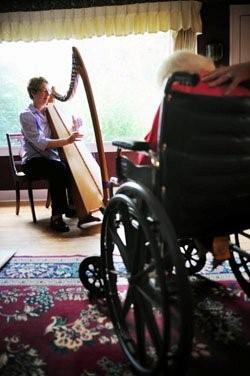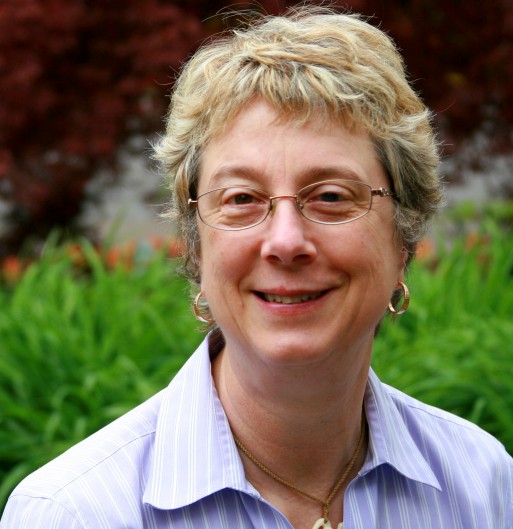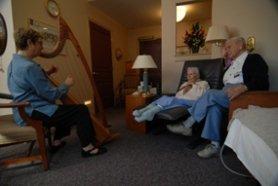Today, SevenPonds speaks with Music Thanatologist Sharilyn Cohn from SacredFlight, a nonprofit based in Portland, Oregon. She graduated with degrees in Music Performance and Music Education from from the University of Memphis and performed as a professional cellist in Memphis and Atlanta. She first learned about music thanatology on an ABC Nightline program in 1998 and subsequently moved to Montana for two years to earn her certification. A member of the Music Thanatology Association International, she has served as conference chair and vice president. Today, she speaks with us about music thanatology and how it can benefit the terminally ill or dying.
Christopher: What is Music Thanatology?
Sharilyn: Music thanatology is a professional field. As music thanatologists, we provide emotional and spiritual comfort both for patients who are terminally ill or dying as well as for their loved ones. We do this using harp and voice and what we call prescriptive qualities, which in a sense are musical prescriptions specifically tailored to the individual.
Christopher: What does it mean to have a musical prescription? What does it look like from person to person?
Sharilyn: Let me give you an example. Let’s say [you] want to put some music on to cheer yourself up — you go through your CD’s and say “no, no, no—yes. This is what I need to hear.” [That’s] your musical prescription. There was something in you that knew what was going to be prescriptive or therapeutic.
We take musical elements and compound them in a way that is most supportive for that person, at that time. We don’t play familiar music; it’s not as though I’m going to play “You are my Sunshine.” The musical elements most supportive to a particular person could be minor tonalities, short repeated phrases, lower register [or] unmetered rhythm. These I would emphasize in his or her musical offering.
Christopher: I understand that your play to the rhythm of the patient’s breathing. Does the breathing change as the person is dying? Does the music change or modulate to the change of breathing?
“There was something in you that knew what was going to be prescriptive or therapeutic.”
–Sharilyn Cohn
Sharilyn: There’s a lot to consider in the breathing. Sometimes during the visit there’s not much change; sometimes there’s significant change. We pay attention to how fast or slow the person is breathing. Is it easy for them to breath, or difficult and labored? Is it shallow or deep? Sometimes the breathing does not have a pattern, and there can even be periods of apnea, which is where there’s no breathing at all for a period of time.
Sharilyn’s three-step summary:
1. Music-thanatology is a professional field within palliative care that unites music and medicine in end-of-life care.
2. With harp and voice, music-thanatologists use music prescriptively to help to ease physical symptoms such as pain, restlessness, agitation, sleeplessness and labored breathing (and emotions such as anger, fear, sadness and grief).
3. Many hospitals and hospice centers provide music-thanatology.
Christopher: What are benefits of this form of palliative care to the patient or to the close relatives of the person?
Sharilyn: Many times the patient’s breathing might become easier or softer. They become more relaxed; sometimes they’re able to fall asleep. [These] are [the] benefits for the family as well.
During a music thanatology visit—we call it a vigil—a lot of significant things can happen. I remember one story in particular. We had been called in to see a gentleman who had been dying. There was family strife and a lot of tension in room. But after half an hour of playing, I sensed there was a shift; the family members started warming up to each other. They didn’t really understand what happened but they were really grateful for the vigil because they were able to put aside their negative feelings and come together.
“During a music thanatology visit—we call it a vigil—a lot of significant things can happen.”
–Sharilyn Cohn
Christopher: How do people outside of Oregon find such a service? Are there organizations that provide music thanatology vigils elsewhere?
Sharilyn: Most music thanatologists work as employees to hospitals and hospices. But you can go to the Music Thanatology Association website and find the list of certified music thanatologists. The SacredFlight website [also] lists institutions.
Christopher: What is the relationship between hospitals and music thanatology?
Sharilyn: Well certainly more and more hospitals are looking for music thanatologists. SacredFlight works closely with several hospitals and hospices and some physicians even have [us] listed as a protocol for when life-sustaining treatment [stops].
 Christopher: You’ve been in a study recently. What was the study as how was it conducted?
Christopher: You’ve been in a study recently. What was the study as how was it conducted?
Sharilyn: It was through a survey. Six weeks after a vigil, a family was sent a questionnaire about how they perceived the effects of the vigil. There were almost as many comments on how it helped them as there were for how it helped their loved ones. Mostly these comments underscored the positive effects on the family’s anxiety and stress, which is huge, but I really liked how they said that the vigil decreased the feelings of distance and separation they experienced as their loved one moved towards death.
“…the vigil decreased the feelings of distance and separation [the family] experienced as their loved one moved towards death.”
–Sharilyn Cohn
I can’t tell you how many times I’ve heard people say “I had no idea what this was going to be like.” We hear over and over again that there’s no good way to explain it; you just have to experience it. It’s so different from any other type of musical experience. Once people have a vigil, they can’t stop talking about it.
Christopher: Sharilyn, thank you so much for speaking with us today. I am grateful to learn about such an inspiration field.
Sharilyn: Of course. Thank you for providing this opportunity!
More Interviews from SevenPonds:
- What is the Nature of Sound Healing? An Interview with Silvia Nakkach, Part 1
- What is Restorative Art? – An Interview with Beth Corwin
- What is Therapeutic Music? – An Interview with Lucy Banks

 What is Music Thanatology? An Interview with Sharilyn Cohn
What is Music Thanatology? An Interview with Sharilyn Cohn




 First the Wealth Gap, Now the U.S. Has a Growing Health Gap
First the Wealth Gap, Now the U.S. Has a Growing Health Gap

 Our Annual Seven Holiday Gifts for Someone Who Is Grieving, 2024 Edition
Our Annual Seven Holiday Gifts for Someone Who Is Grieving, 2024 Edition














